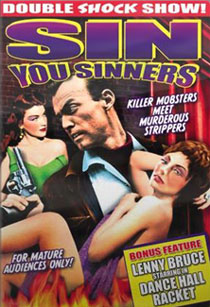 Ultra low budget Sin You Sinners (1963) opens on an image of a burlesque queen's routine, among drunken floozies & seedy men, in a small burlesque club. One of the women is Bobbi (June Colbourne), an old hag of a hooch dancer.
Ultra low budget Sin You Sinners (1963) opens on an image of a burlesque queen's routine, among drunken floozies & seedy men, in a small burlesque club. One of the women is Bobbi (June Colbourne), an old hag of a hooch dancer.
Her daughter Julie (Dian Lloyd), no longer a spring chicken herself, flees the club in horror of the world she grew up in. She has only loose change in her pocket as she enters an all night cafe & orders something cheap. A man flirts with her, & for once she's just nice girl some guy might try to pick up.
Julie has a homelife right out of an episode of Jerry Springer. Her stripper mom runs a voodoo scam out of her home, while depressed Julie writhe-dances, faking possession in her undies. Bobbi pretends to be a Priestess of Maya, & knows a bit about hypnotism.
When Julie passes out from the performance, she wakes from troubled sleep, gets all glassy-eyed. She has to contend with the lacivious interests of Dave (Derek Murcott), though he's her mother's lover. Julie regards herself completely lost & dirty, & warns Dave that her mom's ex-lovers have all died. She believes her mom is evil & saps her lovers' will to live. She believes she can never leave her mother, due to her mother's powers.
As near to unwatachable as any Z-budget grindhouse sleeze gets, Sin You Sinners attempts both to be sexploitative, & to stay legal for the era when imprisonment was always a possibility for pornographers.
So it seems to be about prostitutes though by saying they're burlesque queens, & the blurlesque club (not even a proper theater) seems to stand in for a bordello. There's no direct allusions to prostitution & no more sex in it than better budgeted films. So it's promising a lot more than it ever intended to deliver.
Simultaneously it tries to be something that could be marketed as horror, but aciduously avoids any content in the script that might've lent solid proof of the supernatural, as there was only enough budget for some talking & wiggling. So it's two disappointments for the price of one.
The most daring it gets is seedy behavior & striptease from aging Bobbi, who may have voodoo powers through the magic dubloon on her necklace, though probably that's all fraud. But if enough people believe in this magic, it's as good as real.
[SPOILER ALERT!] Eventually Bobbi's boyfriend succeeds at seducing Julie & the two of them plan to abandon Bobbi. They leave by bus & check into a motel at some random destination. Meanwhile Bobbi's doing her strip act at the crummy little club, though her usual drummer, Dave, didn't show up.
Afterward she realizes she's been abandoned by both lover & daughter, & starts tugging at her magic dubloon, which might or might not be what causes Dave to abandon Julie to return to Bobbi.
Julie straggles home soon thereafter & her mom doesn't even seem to be angry. Julie now completely believes in the dubloon's power, as she takes up her own career as rival burly-q or hooker. Having grown fond of Dave, she wants to save him from the doom that overtook her mother's previous discarded lovers.
Another rival, Gloria (Beverly Nazarow), is also hot for Dave. So both women are after the dubloon, & both are after Dave. Bobbi hypnotises Ben (Charles Clements) to kill Gloria then himself. Dave & Julie were witnesses to the murder-suicide, & the dubloon was accidentally flung to where the two of them were hiding.
Without her dubloon, Bobbi's age suddenly becomes more obvious. The object is now Julie's, & she becomes the new burlesque star with power over men. [END SPOILER ALERT]
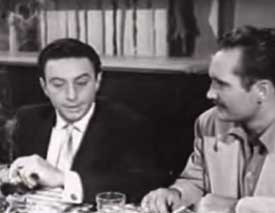 Dance Hall Racket (1953) was a "roadshow" production, a mild sexploitation film inspired by burlesque roadshows. A good print was packaged as part of a double-bill with Sin You Sinners.
Dance Hall Racket (1953) was a "roadshow" production, a mild sexploitation film inspired by burlesque roadshows. A good print was packaged as part of a double-bill with Sin You Sinners.
It was written by commedian Lenny Bruce who frequently performed in burlesque houses or anywhere that would let him, & he stars in it as well, as a psychotic gangster named Vinnie. Also featured is Lenny's wife Honey Harlow.
With the exception of a couple of odd tongue-in-cheek moments, Lenny has not written a comedy. From his creative side, he seems really to have intended a full-out gangster movie with classic film noir & detective pulp magazines his inspirations, even though falling far short of the model.
Talented as Lenny was as a comic, it's bizarre to see him fail so utterly as a screenwriter & actor. His performance as a murderous nutjob gangster might've been made credible by a skillful director, but Phil Tucker is generally regarded as one of cinamatic history's worst directors.
Admiring Lenny, one wishes to believe he was bad on purpose, playing it tongue in cheek, knowing as he must have known that roadshow movies had to be bad to be any good. Unfortunately it feels much more like he'd been reading a lot of pulp magazine crime fiction & thought he had a real script in him, even if no one but a roadshow producer would ever film it.
That a film noir was the goal is indicated by the use of "window blind shadows" on rear walls, & the shoot-out in the dirty alley that serves as climax.
Timothy Farrell plays gangster Umberto Scali, a character he also played in The Devil's Sleep (1949) & Girl Gang (1954), but best known among fans of ultra-shlock for having appeared in Ed Wood films.
Scali runs a dance hall where girls are apt to drug their customers & lift their wallets. If the customers complain, Vinni is not above protecting the girls by killing the customers. Along the way we get some "roadshow" style girl-tease stuff rendered amusing only because Lenny Bruce is frequently standing around.
Scali also fences jewels smuggled by sailors, then has the sailors robbed of the money he gives them. In this environment Vinni thrives for a while & his psychosis seems barely to be noticed, until at last he turns even on his boss, after which it all comes to a shoot-out conclusion in a dirty alley.
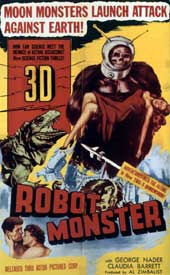 Dance Hall Racket's director is best known for Robot Monster (1953) in which the robot is a guy in a gorilla suit but wearing a diving helmet instead of a gorilla head. What passes for special FX includes such shockers as the use of a Lawrence Welk style bubble machine which we are to believe is a communication device.
Dance Hall Racket's director is best known for Robot Monster (1953) in which the robot is a guy in a gorilla suit but wearing a diving helmet instead of a gorilla head. What passes for special FX includes such shockers as the use of a Lawrence Welk style bubble machine which we are to believe is a communication device.
Robot Monster is famed as one of the worst science fiction films of all time, something unintentionally hysterical happening in almost every scene. With his second film Dance Hall Rackethe attempted to equal his achievement by presenting the worst would-be film noir.
However, because he had a script for Dance Hall Racket was only mildly incompetent for the film noir attempt, he ultimately failed at equalling the wonderful awfulness of Robot Monster, as his script for that film would have had to have been improved by factors of a thousand to be only mildly incompetent.
The suicidally depressive Tucker apparently intended his films to be good ones, much as did Ed Wood, men who simply lacked any capacity to assess the difference between success & failure. The dialogue for Robot Monster indicates a mentality about equal to a creative eleven year old, with almost every sentence out of anyone's mouth a howler.
If it had in fact been filmed by an eleven year old, it would be interesting to see what he made when he grew up. Alas it was made by a twenty-something & this would stand as his "best" film in its ability to have you giggling over its sincerity & foolishness.
If you have some witty chums to watch it with, this could literally have you falling on the floor with laughter. If you thought Plan 9 from Outer Space (1959) was the worst science fiction film ever made, you have got to see Robot Monster -- as also Arthur J. Nelson's The Creeping Terror (1964), both of which make Ed Wood seem artful.
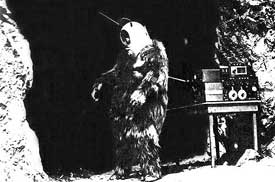 The ape-bot's death ray destroys most of the world population but when he's confronted by the few remaining survivors, the best he can do is strangle them one by one. His mightiness probably couldn't get him to the top of the Empire State Building, let alone destroy the world. Also the ape-bot has a sentimental streak, having a thing for human females. The ape-bot's death ray destroys most of the world population but when he's confronted by the few remaining survivors, the best he can do is strangle them one by one. His mightiness probably couldn't get him to the top of the Empire State Building, let alone destroy the world. Also the ape-bot has a sentimental streak, having a thing for human females.
The little boy named Johnny who the robot killed turns out, by the trick ending, to have been the point of view character throughout, even after he died, & this weirdly enough gives a whimcial "rationality" to the stupid film. It seemed like a little kid daydreamed it because a little kid daydreamed it.
But the weirdests thing about the film is how, despite incompetence on every other level, it actually has an effective soundtrack. By the most improbable stroke of good luck, the talentless director gave Elmer Bernstein, of all people, one of his earliest opportunities to score a film.
Bernstein would go on to write scores for Otto Preminger's The Man with the Golden Arm (1955), Cecile B. DeMille's The Ten Commandments (1956), John Sturges's The Great Escape (1963), & much else of enormous consequence, as well as the Marlborough cigarette themesong taken from Sturges's The Magnificent Seven (1960) which among boomers is second only to the Bonanza title song in easily remembered western theme music.
Robot Monster is like if some Down's Syndrome kid crayoned all over the wall, his toothless crackhead mom called it a movie, & Lalo Schifrin or Jerry Goldsmith wrote a score for it.
copyright © by Paghat the Ratgirl
|
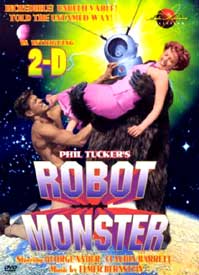



 The ape-bot's death ray destroys most of the world population but when he's confronted by the few remaining survivors, the best he can do is strangle them one by one. His mightiness probably couldn't get him to the top of the Empire State Building, let alone destroy the world. Also the ape-bot has a sentimental streak, having a thing for human females.
The ape-bot's death ray destroys most of the world population but when he's confronted by the few remaining survivors, the best he can do is strangle them one by one. His mightiness probably couldn't get him to the top of the Empire State Building, let alone destroy the world. Also the ape-bot has a sentimental streak, having a thing for human females.